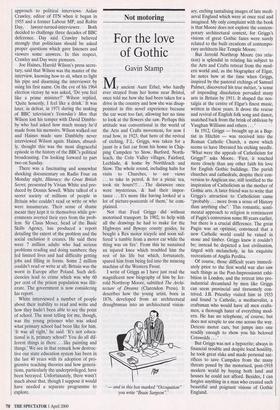Not motoring
For the love of Gothic
Gavin Stamp
My ancient Aunt Ethel, who hardly ever strayed from her home near Bristol, once told me how she had been taken for a drive in the country and how she was disap- pointed in this novel experience because the car went too fast, allowing her no time to look at the flowers she saw. Perhaps this attitude was conventional in the world of the Arts and Crafts movement, for now I read how, in 1923, that hero of the revival of etching, F.L. Griggs, was taken for a jaunt in a fast car from his home in Chip- ping Campden 'to Stow, Burford, North- leach, the Coln Valley villages, Fairford, Lechlade, & home by Northleach and Stow. The whole round, including halts for visits to Churches, to see views ... to take in petrol, & for a picnic tea, took six hours!!! ... The distances once were mysterious, & had their impor- tance . It's more like having looked at a lot of picture-postcards of them,' he com- plained.
Not that Fred Griggs did without motorised transport. In 1902, to help with all the drawings he had to make for the Highways and Byways county guides, he bought a Rex motor tricycle and soon suf- fered 'a tumble from a motor car while the thing was on fire'. From this he sustained an injured knee which troubled him the rest of his life but which, fortunately, spared him from being fed into the mincing machine of the Western Front.
I write of Griggs as I have just read the magnificent new biography of him by Jer- rold Northrop Moore, subtitled The Archi- tecture of Dreams (Clarendon Press). It describes how the young artist, born in 1876, developed from an architectural draughtsman into an architectural vision- - and in this box marked "Occupation" you write "Brain Surgeon".' ary, etching tantalising images of late medi- aeval England which were at once real and imagined. My only complaint with the book is that Moore does not explore the contem- porary architectural context, for Griggs's visions of great Gothic fanes were surely related to the built creations of contempo- rary architects like Temple Moore.
But Jerrold Northrop Moore (no rela- tion) is splendid in relating his subject to the Arts and Crafts retreat from the mod- ern world and, as the biographer of Elgar, he notes how at the time when Griggs, inspired by the pastoral etchings of Samuel Palmer, discovered his true métier, 'a sense of impending dissolution pervaded many arts in Britain by 1911. It shaped the nos- talgia at the centre of Elgar's finest music, written in these years. It drove the rescue and revival of English folk song and dance, snatched back from the brink of oblivion by Vaughan Williams and others ... '
In 1912, Griggs — brought up as a Bap- tist in Hitchin — was received into the Roman Catholic Church, a move which seems to have liberated his etching needle. `What were the appeals of Catholicism for Griggs?' asks Moore. 'First, it touched more closely than any other faith his love for English Gothic buildings. The parish churches and cathedrals, despite their con- version to Anglican use, still testified to the inspiration of Catholicism as the mother of Gothic arts. A later friend was to write that Griggs's attraction to Catholicism came "probably ... more from a sense of History than anything else".' This romantic, senti- mental approach to religion is reminiscent of Pugin's conversion some 80 years earlier, but there is a crucial difference. The great Pugin was an optimist, convinced that a new Catholic world could be raised in stone and timber. Griggs knew it couldn't be; instead he depicted a lost civilisation, tinged with melancholy, in his exquisite recreations of Anglia Perdita.
Of course, those difficult years immedi- ately prior to the first world war also saw such things as the Post-Impressionist exhi- bition in London, and the retreat into pre- industrial dreamland by men like Griggs can seem provincial and tiresomely con- trived. J.B. Priestley visited him in 1933 and found 'a Catholic, a mediaevalist, a craftsman who would have all men crafts- men, a thorough hater of everything mod- em. He has no telephone, of course, but does not scruple to use one across the way. Detests motor cars, but jumps into one readily enough to show you his beloved Cotswolds ' But Griggs was not a hypocrite; always in financial trouble and despite local hostility, he took great risks and made personal sac- rifices to save Campden from the many threats posed by the motorised, post-1918 modern world by buying both land and houses he could not afford. Besides, I can forgive anything in a man who created such beautiful and poignant visions of Gothic England.






















































































 Previous page
Previous page